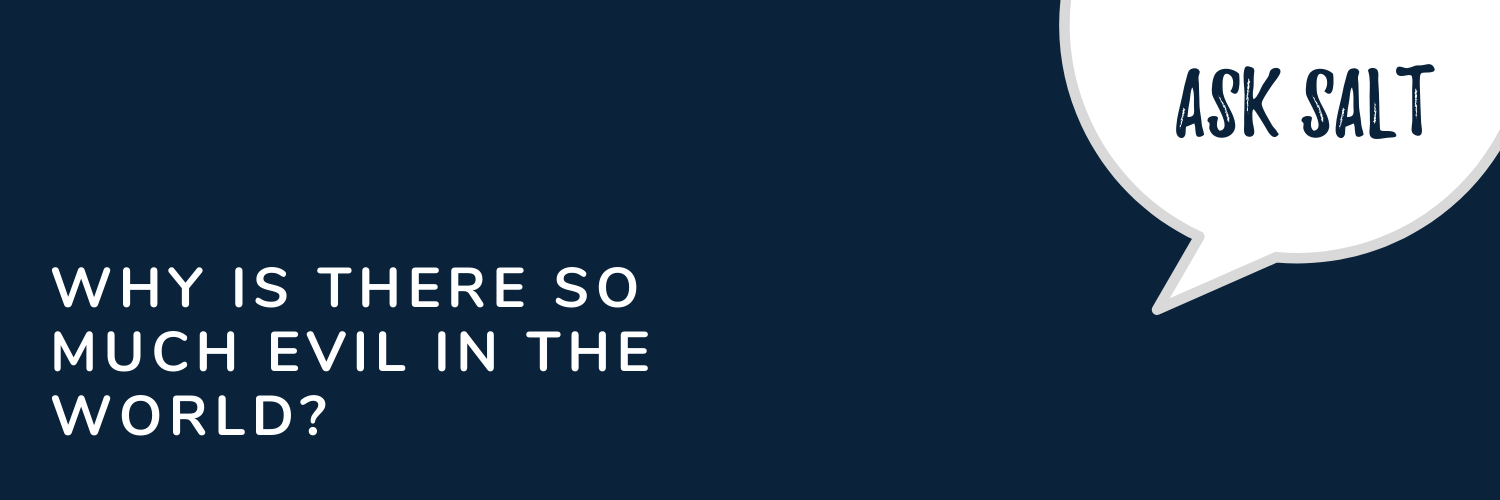|
This is the most difficult question to answer as a theist. We, as Christians accept that suffering is a result of evil existing in the world. C.S. Lewis once said contemplating on the topic that “suffering is God’s megaphone to a deaf world.
But how would an atheist reconcile the thought of a benevolent, omnipotent, omniscient God and suffering. Surely if God is as all-powerful as He is, He can stop suffering altogether. Breaking up the thought into a few components in order to approach the question, we first look to the question and the questioner themselves. The question is based on values that prove rather than disprove the existence of God because you wouldn’t ask the question if you don’t believe in an absolute moral law. And if you wouldn’t believe in an absolute moral law unless you believed that there is a moral law giver. So God must be involved in the paradigm, not away from it. Both believers and nonbelievers alike, can agree that the ultimate ethic in life is love. There is no higher standard that a human can experience in life beyond love. And a major component of love is free will. In other words, free will is indispensable to love. So to keep God, love and free will in the paradigm, there must be the free will to also choose evil which is separation or deviance from love. And this is the consequence of God’s supreme effort. Another thought on this matter is this: If I was to take a life, that tragedy would be irreversible. But if God takes it, He has the power to bring life into it again in eternity. So without eternity, the problem of evil would still be unanswered. Thus, because God is able to restore life and He grants us eternity, eternity leads to eternal justice.
1 Comment
Reconciling the prevalence of evil in the world--from wars to corruption to violence to abuse-- with the existence of an all-loving God sometimes feels like a feat. But it’s not a far-fetched argument to understand that both God and evil can exist at the same time.
God gave us free will. He gave us the decision to choose between living in love and acting in hate. This free will is fundamentally what gives meaning to the actions we take. Without this agency, we would simply behave as dictated to us. Our actions would not be our own, but belonging to someone else. And thus, they could never be inherently good or bad. For instance, choosing to be selfless is built upon the existence of an opportunity to act in self-interest. A selfless act could never exist in isolation. The sacrifice it necessarily entails means it must coincide with the opportunity to act otherwise--in this case, the opportunity to act selfishly. Without free will, the value of being selfless is not a choice and its value disappears. Likewise, goodness can only retain its value if the option to choose evil is there. It is not necessarily one grand decision, but a series of small ones that we take in our day-to-day. Choice imposes the value that attributes “goodness” to good and “badness” to bad. “See, I have set before you today life and good, death and evil, in that I command you today to love the Lord your God, to walk in His ways, and to keep His commandments, His statutes, and His judgments, that you may live and multiply; and the Lord your God will bless you in the land which you go to possess” (Deuteronomy 30:15-16). There are two extreme approaches to answer this question. Calvinism is the idea that God’s sovereignty dictates every thought, word or action of every man, making man essentially a Robot. Conversely, Arminianism is the idea that man is completely autonomous, free to do as he chooses without any divine influence.
But, there is a balanced approach. God left us the choice to respond to His love or reject it, this gift of freedom is an expression of His great love. God created human beings free to make their own choices, but our freedom is in some ways limited. For example, we are not free to choose our parents, our race, or where we were born. We have free will within the boundaries set by God in accordance with His sovereign purpose for each individual. We are free to make our own choices and be responsible for them all, but our free will never override God’s providential will; there is not one thing that happens on this Earth that is not allowed by God. God is Omnipotent meaning all powerful, but He does not interfere with our free will unless we submit our free will to Him. Likewise, God is also Omniscient or all knowing, but God’s foreknowledge of the future does not interfere with our freedom. There is a story from Scripture that displays this concept very nicely. In the story of Joseph in the book of Genesis, his brothers sold him into slavery in Egypt. Years later when Joseph is reunited with his brothers he says to them, “You meant evil against me; but God meant it for good…” (Genesis 50:20). This indicates that while his brothers’ actions may have been evil, God still allowed them to practice their free will. They were fully accountable for selling Joseph into slavery, but God had certain plans and intentions related to their actions. God is not interested in having slaves and He doesn’t need us in any way, what He wants is a relationship with every single one of us. Like any other relationship, each person has a choice whether or not they would like to remain in the relationship. However, unlike a friend choosing not to be friends, a son or daughter cannot choose not to be a child of their parent anymore. Similarly, our identity is not something left for us to choose, we are made by Him in His image. Interested in reading more about this topic? Read "Is Our Future Determined or Free?" by Michael Ramsden to learn more. To understand why God created us, a natural question we can ask is—why do parents choose to have children? Is it so they come into the world and suffer? Or is it to share the love and joy they have with them? Children are the product of love. God is complete in His Trinity, lacking nothing, so our creation was not out of need or loneliness, but out of love. Out of His love, He said, “Let Us make man in Our image, according to Our likeness." So God created man in His own image; in the image of God He created him; male and female He created them" (Genesis 1:26-27). He created us to enjoy Him and all that He has created and done for us. God created man to have a personal love relationship with Him. The reason we are here is to experience and enjoy that relationship. He saved us and gave us His Holy Spirit to bring us back to His image that was distorted after Adam's fall. However, God never enforces His love on us. He gives us the choice to answer His calling to taste, experience, and enjoy His love. "Behold, I stand at the door and knock. If anyone hears My voice and opens the door, I will come in to him and dine with him, and he with Me" (Revelation 3:20). That is how personal God wants a relationship with us. He wants to come into our hearts, feed us, fill us with His Holy Spirit, fix us from any brokenness, and shower us with His unconditional love.
By understanding the reason God created us—His love—we can begin to focus on our purpose in life which is to answer His calling of love, to taste it, live it, and share it with others. He is a personal God who desires an intimate relationship with us. God is calling us to love Him and says, “let me see your face, let me hear your voice; for your voice is sweet, and your face is lovely.” (Song of Solomon 2:14). The question is—Will you answer His call of love? This question may seem difficult to answer at first but when we look deeper, we understand that the question is based upon the wrong assumption. It implies that God is also governed by time the way we are. But how can He who created time, also be confined by time and its constraints? God is not confined by the same boundaries that govern our world such as space and time, and He has no beginning or end. He is infinite and eternal. When we understand this, we see how the question of “who created God?” is ultimately a fallacy. If we could answer this question, then logically the next question would be “who created the person who created God?” and so on and so forth. This would then create confusion about who we should worship, God or God’s creator? Where does it end? The reason why one may ask this question is because of our own observations of creation on earth. Human life, for example, has a definite beginning and end. We are finite beings made by a creator. But when we try to apply these same characteristics to God (the creator) the question does not stand. “In the beginning was the Word, and the Word was with God, and the Word was God. He was in the beginning with God. All things were made through Him, and without Him nothing was made that was made” (John 1:1-3). Christian author, George Bassilios, likened asking this question to asking “Who is the bachelor’s wife”? A bachelor, by definition, is unmarried and has no wife. Therefore, the question self-destructs and is rendered meaningless. God, by definition is not a physical or finite being, but an eternal being with no beginning.
When we understand this, it does not make sense to ask who created God. He is uncreated. |
AuthorWe are many voices, united by the same Spirit, driven to Serve Apostolic Love and Testimony. Archives
February 2024
Categories
All
|





 RSS Feed
RSS Feed